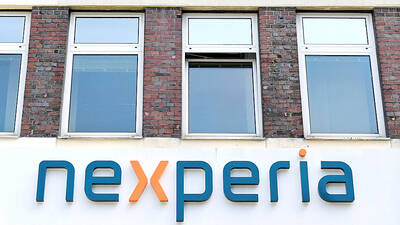Foreign buyers are expected to purchase 12 percent more electronics, worth US$28 billion, this year from last year during the annual Computex trade fair in Taipei, strengthening the expectation that the industry was set to stage a dramatic rebound next quarter, organizers said yesterday.
The figure would be equivalent to a 25 percent share of Taiwan’s US$113.6 billion of electronics exports last year, said Walter Yeh (葉明水), executive vice president of the Taiwan External Trade Development Council (TAITRA, 外貿協會), co-organizer of the world’s No. 2 computer trade show.
About 36,000 buyers, including 10 heavyweight companies with annual sales of US$1 billion each, are due to visit the exhibition, which would feature Ultrabook computers, smart devices, e-readers and cloud-technology products, Yeh said.
Last year, overseas buyers bought US$25 billion worth of electronic devices during the show, TAITRA said.
This year’s Computex will be the biggest in its 32-year history as the number of booths rose to 5,400, up about two percent from 5,300 booths last year, TAITRA said.
The expansion in the show matched an improvement in business confidence based on a survey conducted by Taipei Computer Association (TCA, 台北市電腦公會), another co-organizer of Computex.
“The confidence index bounced back from a low level in the third and fourth quarters of last year,” said Chang Li (張笠), deputy secretary general of TCA, told a media briefing yesterday.
The latest survey showed that the index rose to 1.62 for next quarter, from 1.26 in the first quarter, indicating that more local companies were optimistic about next quarter’s prospects. A reading of 1.5 means an expectation of flat sales growth for the upcoming quarter.
About 42 percent of respondents were slightly positive about the business outlook for the next quarter, up from 22 percent in the survey conducted the previous quarter.
Samsung Electronics Co has rented 30 booths to showcase their latest products this year, its first appearance in several years after the South Korean electronics giant pulled back from the show, TAITRA said.
Intel Corp, Microsoft Corp, Nvidia Inc and ARM Holdings Inc have also booked space.
Devices equipped with Microsoft’s new operating system, Windows 8, and mobile devices powered by quad-core chips would be the focal point during this year’s trade show, TAITRA said.
Local PC maker Asustek Computer Inc’s (華碩) new PadFone, a mobile device that combines the functions of phones, tablets and notebook, is expected to be unveiled during Computex. Asustek declined to comment on speculation at yesterday’s press conference. The company unveiled new products at the Mobile World Congress last month in Barcelona, Spain.
Taiwan-branded PC maker Acer Inc (宏碁), contract notebook computer maker Quanta Computer Inc (廣達) and electronics manufacturing service provider Hon Hai Precision Industry Co (鴻海) will also be showcasing their latest products at Computex.
In total, 1,800 local and foreign companies are set to display their latest products during Computex, TAITRA said. Computex will run from June 5 through June 9, it said.

Jensen Huang (黃仁勳), founder and CEO of US-based artificial intelligence chip designer Nvidia Corp and Taiwan Semiconductor Manufacturing Co (TSMC, 台積電) on Friday celebrated the first Nvidia Blackwell wafer produced on US soil. Huang visited TSMC’s advanced wafer fab in the US state of Arizona and joined the Taiwanese chipmaker’s executives to witness the efforts to “build the infrastructure that powers the world’s AI factories, right here in America,” Nvidia said in a statement. At the event, Huang joined Y.L. Wang (王英郎), vice president of operations at TSMC, in signing their names on the Blackwell wafer to

AI BOOST: Although Taiwan’s reliance on Chinese rare earth elements is limited, it could face indirect impacts from supply issues and price volatility, an economist said DBS Bank Ltd (星展銀行) has sharply raised its forecast for Taiwan’s economic growth this year to 5.6 percent, citing stronger-than-expected exports and investment linked to artificial intelligence (AI), as it said that the current momentum could peak soon. The acceleration of the global AI race has fueled a surge in Taiwan’s AI-related capital spending and exports of information and communications technology (ICT) products, which have been key drivers of growth this year. “We have revised our GDP forecast for Taiwan upward to 5.6 percent from 4 percent, an upgrade that mainly reflects stronger-than-expected AI-related exports and investment in the third

RARE EARTHS: The call between the US Treasury Secretary and his Chinese counterpart came as Washington sought to rally G7 partners in response to China’s export controls China and the US on Saturday agreed to conduct another round of trade negotiations in the coming week, as the world’s two biggest economies seek to avoid another damaging tit-for-tat tariff battle. Beijing last week announced sweeping controls on the critical rare earths industry, prompting US President Donald Trump to threaten 100 percent tariffs on imports from China in retaliation. Trump had also threatened to cancel his expected meeting with Chinese President Xi Jinping (習近平) in South Korea later this month on the sidelines of the APEC summit. In the latest indication of efforts to resolve their dispute, Chinese state media reported that

CHINESE EXPORT CURBS: A dispute between China and the Netherlands could halt chip supply, affecting vehicle production, US and European auto associations said Groups representing major automakers late on Thursday warned that a chip disruption stemming from a dispute between China and the Dutch government could quickly affect US auto production. Automakers and their suppliers received notice from chipmaker Nexperia (安世半導體) last week that it could no longer guarantee delivery of its chips, the European Automobile Manufacturers Association said, adding that manufacturing could be significantly disrupted. In the US, the Alliance for Automotive Innovation, which represents General Motors, Toyota, Ford, Volkswagen, Hyundai and nearly all other major automakers, urged a quick resolution. “If the shipment of automotive chips doesn’t resume — quickly — it’s going to